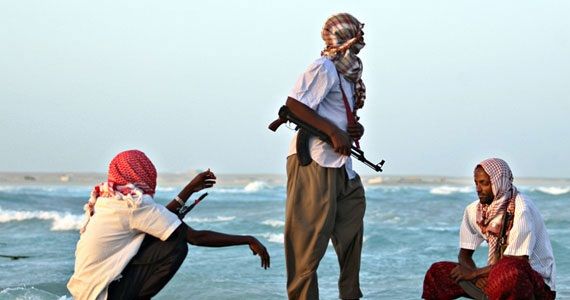In the quiet coastal town of Eyl, Somalia, two men, their identities concealed under large scarves, entered a room for a clandestine meeting. They’ve recently transitioned from being fishermen to gun-wielding pirates, driven by the allure of million-dollar ransoms. “You are free to record – we accept,” one of them stated, settling down for an interview that took months to arrange.
This cautious demeanor starkly contrasts with the swagger of past pirates who once made Eyl, nestled between the arid mountains along Somalia’s Indian Ocean coast, their stronghold. Known as “Harunta Burcadda” or the Pirate Capital during the piracy surge from 2005 to 2012, Eyl was a base from where pirates launched attacks on global shipping lanes, including container ships and oil tankers, forcing rerouting of maritime traffic.
During those peak years, pirates amassed between $339 million and $413 million in ransoms, as estimated by the World Bank. However, their dominance waned with the arrival of international naval patrols, including the Puntland Maritime Police Force, which now has a presence in Eyl. While the community largely welcomed this change due to the negative impacts of piracy like inflation, substance abuse, and a tarnished reputation, the underlying resentment towards foreign fishing vessels, accused of plundering local resources, persists.
Farah, one of the fishermen-turned-pirates, shared how a foreign trawler crew stole their fishing nets, catch, and destroyed their engine last year, costing them a $10,000 investment. His companion, Diiriye, recounted a tragic incident where relatives were found dead at sea, victims of violence from these foreign vessels. “We work and live by the sea. The sea is our business. When someone intimidates you and robs you, it is compulsory to fight,” Farah explained, emphasizing that piracy was a forced response to their dire circumstances.
The resurgence of piracy in recent years, with 22 attacks in 2024 alone, indicates a shift. Although not all attempts are successful, the high-profile hijacking of the Bangladesh-flagged MV Abdullah in March 2024, which reportedly fetched a $5 million ransom, highlights the potential financial gain.
Pirate operations in Eyl are structured with about 10 gangs, each comprising around 12 members, embarking on 15 to 30-day missions equipped with AK-47s, rocket-propelled grenades, and necessary supplies. Their strategy involves using speed boats to approach larger vessels, employing RPGs to intimidate rather than kill, aiming to secure a ransom.
Funding for these operations comes from local investors, forming syndicates to back different aspects of the pirate ventures, from boats to weapons. The ease of acquiring arms in Somalia, a legacy of prolonged civil unrest, aids these operations.
Despite not being part of the earlier piracy boom, Farah and Diiriye, like many others, see piracy as their only viable economic option in the face of diminishing fishing prospects. Yet, they acknowledge the moral conflict, with Diiriye admitting his fear of his mother’s disapproval if she knew of his activities.
Locally, the impact of past piracy lingers with issues like substance abuse. However, community elders and local authorities, like Puntland’s Information Minister Caydid Dirir, recognize the ongoing problem of illegal fishing, which continues to fuel piracy. Efforts are being made to address this, but challenges remain due to the complexity of licensing and enforcement.
Commander Farhan Awil Hashi of the Puntland Maritime Police Force remains optimistic, focusing on job creation as a deterrent to piracy. “Young people must get jobs, always. If the person is busy doing something, they will not think about heading to the sea and hijacking ships,” he stated, echoing a sentiment shared by Farah and Diiriye, who see no other way to provide for their families but through piracy.
This narrative from Eyl underscores a broader issue of economic desperation driving individuals towards piracy, a problem compounded by foreign exploitation of local resources and the lack of viable alternatives for livelihood.













Leave a comment